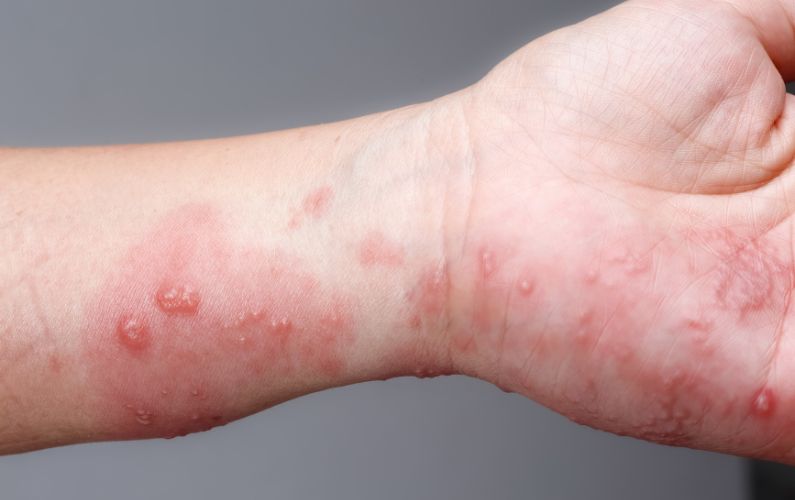Shingles, also known as herpes zoster, is a painful rash caused by the reactivation of the varicella-zoster virus, the same virus responsible for chickenpox. For those who have had chickenpox, the virus lies dormant in the nerve tissue and can reactivate years later, leading to shingles.
The shingles vaccination is a powerful tool in preventing this condition and its complications. This article explores who should get the shingles vaccine and the reasons behind it.
Understanding Shingles and Its Impact
Shingles can affect anyone who has had chickenpox, but the risk increases with age and weakened immune systems. The condition often begins with pain, itching, or tingling in a specific area, followed by a rash that turns into painful blisters. Complications can include postherpetic neuralgia (PHN), a condition where severe pain persists long after the rash clears.
The shingles vaccination significantly reduces the risk of developing shingles and its associated complications. Two vaccines are currently available: Zostavax and Shingrix, with Shingrix being the preferred option due to its higher efficacy.
Recommended Age for the Shingles Vaccine
Adults Aged 50 and Older
The Centers for Disease Control and Prevention (CDC) recommends shingles vaccination for adults aged 50 and older. This age group is at a higher risk of developing shingles and complications such as PHN.
Shingrix is administered in two doses, with the second dose given two to six months after the first. Studies have shown that Shingrix is more than 90% effective in preventing shingles and PHN in this age group.
Immunocompromised Individuals
People with weakened immune systems are also at a higher risk for shingles. This includes those undergoing treatments that suppress the immune system, such as chemotherapy, radiation, or long-term steroid use.
Individuals with conditions like HIV/AIDS or those who have undergone organ transplants should consult their healthcare provider about receiving the shingles vaccination. The timing and suitability of the vaccine will depend on the individual’s health status and treatment plan.
Why the Shingles Vaccine is Important
Prevention of Shingles and Complications
The primary reason to get the shingles vaccination is to prevent shingles and its complications. PHN, the most common complication, can cause debilitating pain that lasts for months or even years. The vaccine also reduces the risk of other complications, such as vision loss if shingles affects the eyes, and neurological problems like encephalitis.
Protecting Public Health
Widespread vaccination helps protect public health by reducing the overall incidence of shingles. This, in turn, decreases the burden on healthcare systems and improves quality of life for older adults and immunocompromised individuals. By getting vaccinated, individuals contribute to community health and reduce the spread of the virus.
Special Considerations
Previous Shingles Episode
People who have already had shingles should still receive the shingles vaccination. While a previous episode provides some immunity, it does not guarantee lifelong protection. The vaccine can help prevent future occurrences and reduce the severity of symptoms if shingles reappears.
Vaccination During COVID-19 Pandemic
During the COVID-19 pandemic, it is essential to continue routine vaccinations, including the shingles vaccine. Healthcare providers have implemented safety measures to ensure vaccinations can be administered safely.
Delaying the shingles vaccination could increase the risk of developing shingles and its complications, especially for older adults and those with weakened immune systems.
Combination with Other Vaccines
The shingles vaccination can be administered alongside other vaccines, such as the flu vaccine. However, it is advisable to consult with a healthcare provider to determine the best vaccination schedule, especially for those with multiple health concerns or a history of allergic reactions to vaccines.
Cost and Accessibility
Insurance Coverage
Most health insurance plans cover the cost of the shingles vaccination. It is important to check with your insurance provider to understand your coverage and any out-of-pocket expenses. For those without insurance, pharmaceutical companies and community health programs may offer assistance or reduced-cost options.
Availability
The shingles vaccine is widely available at healthcare providers’ offices, pharmacies, and public health clinics. Scheduling an appointment ensures that the vaccine is available and allows for any necessary consultations regarding health status and vaccine suitability.
Conclusion
The shingles vaccination is a critical preventive measure for adults aged 50 and older and immunocompromised individuals. By significantly reducing the risk of shingles and its complications, the vaccine helps protect individual health and public health. Consulting with healthcare providers about the shingles vaccine and staying informed about vaccination schedules and coverage options can help individuals make the best decisions for their health.

